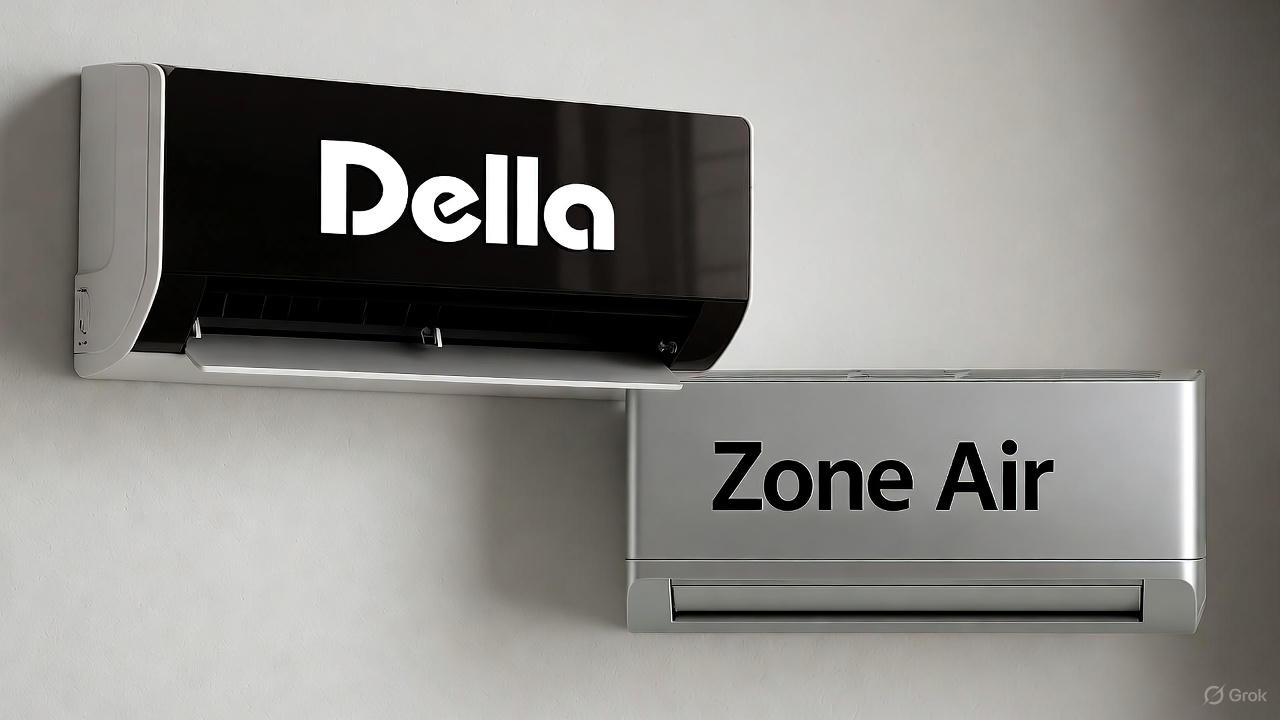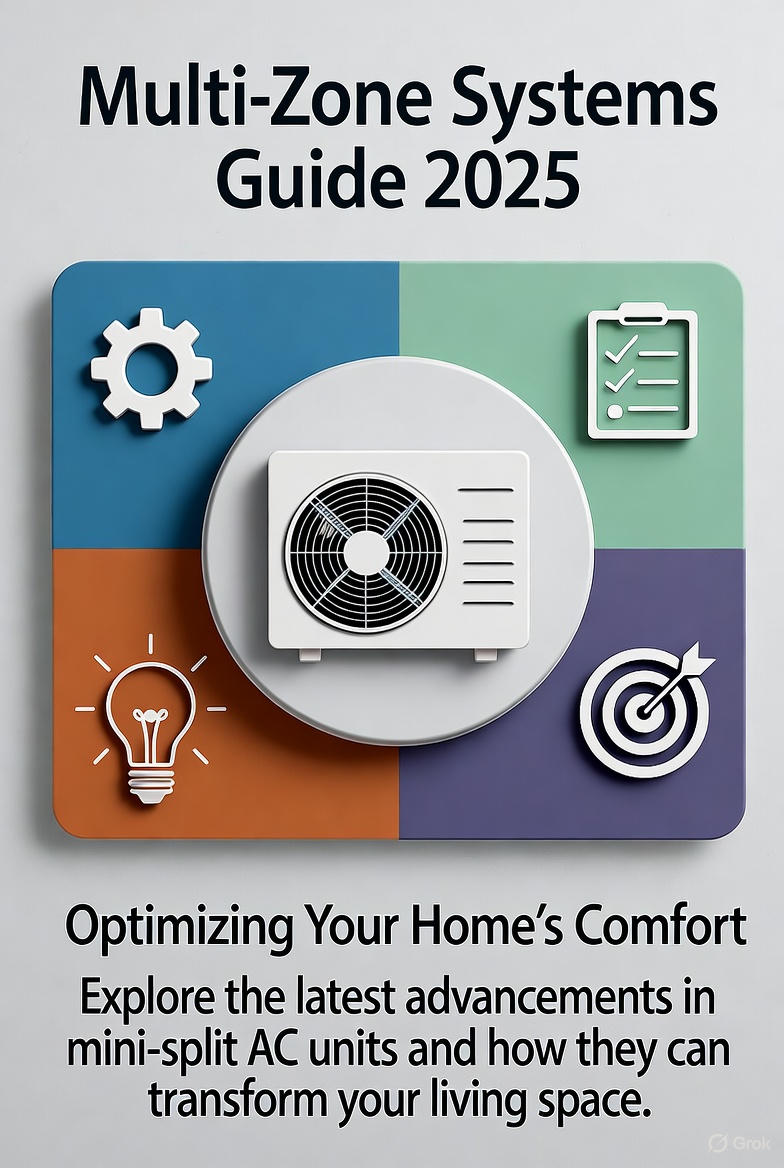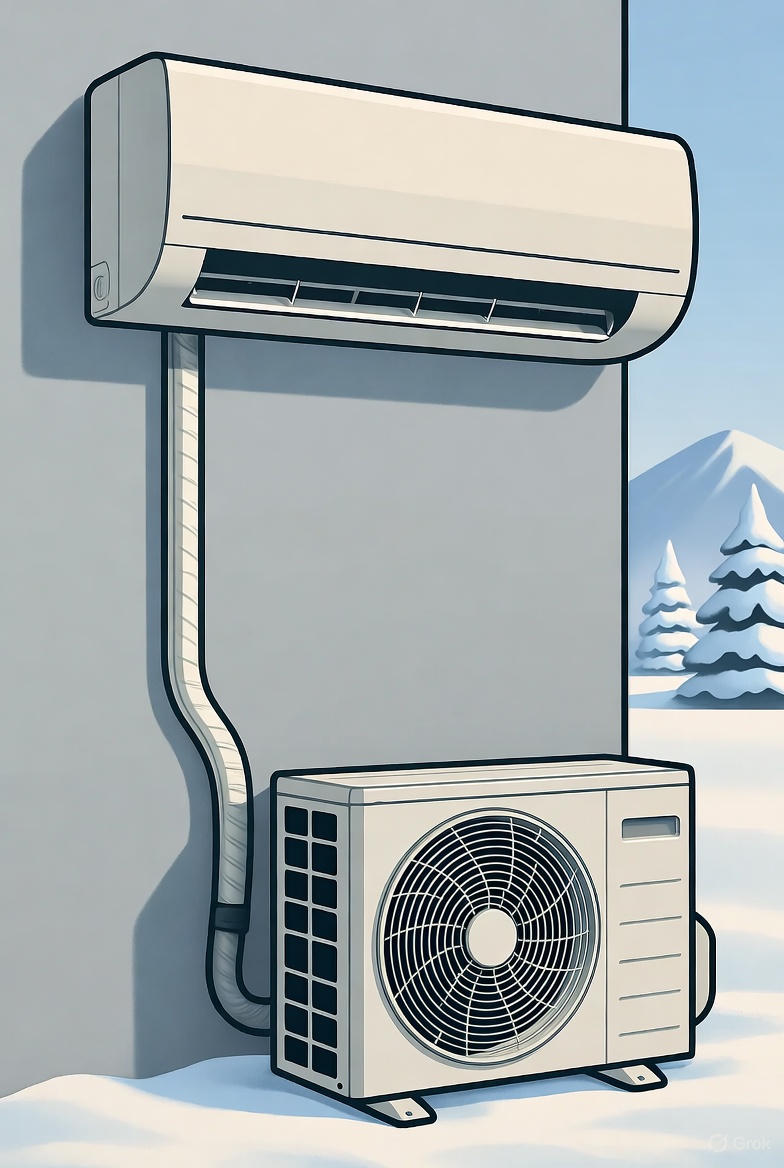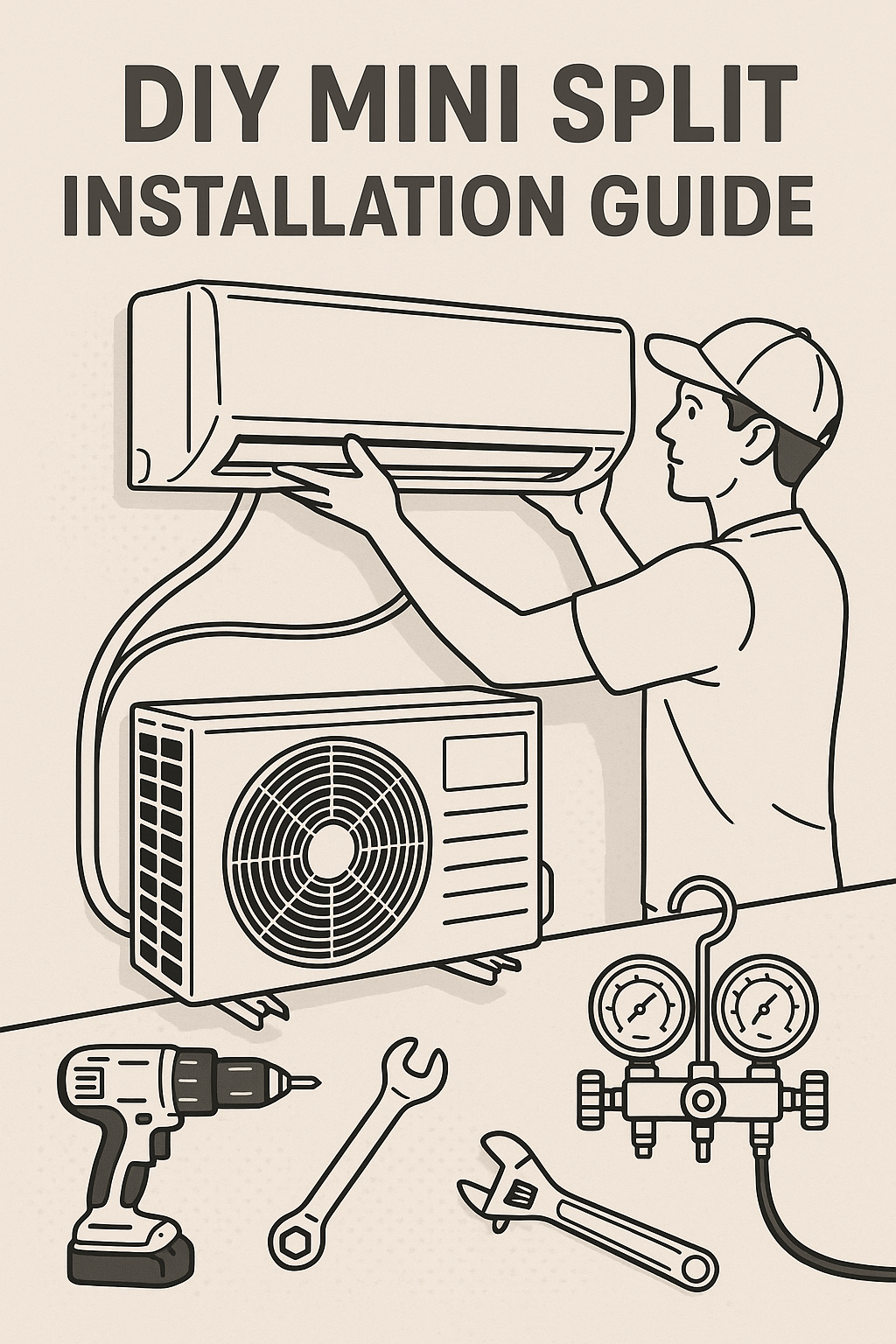When Mark Sullivan started shopping for a mini-split to heat and cool his 400-square-foot garage workshop in Burlington, Vermont, the $700 price difference between Della's $1,199 12K BTU system and Zone Air's $1,899 equivalent seemed like an easy decision. He'd pocket the savings and move on. Then his neighbor mentioned Vermont's winter temperatures regularly dip below zero, and Mark started reading spec sheets more carefully. Della's system stopped functioning below 5°F, while Zone Air operated down to -13°F—a critical difference when February temperatures in Burlington average 18°F with frequent overnight lows near zero.
Mark ultimately chose Zone Air. Three winters later, his workshop maintains comfortable 68°F temperatures even when outdoor temps hit -8°F, while his neighbor's Della system (installed in a sunroom that same year) switches to expensive electric backup heat whenever temperatures drop below 10°F. Mark's slightly higher upfront investment translates to approximately $95 lower heating costs each winter, recovering the $700 price difference in about 7.5 years. More importantly, his system actually works when he needs it most—during those brutal Vermont cold snaps when indoor heating matters most.
This comparison examines where that price difference comes from, what it buys you, and which system delivers better value for different situations and climates. We'll dig into performance data, component quality, warranty coverage, and long-term ownership costs to help you make the right decision.
Transparency Note: This comparison is written by Zone Air. We've aimed for objectivity and honesty about where Della offers advantages, but readers should consider this context. All specifications are verifiable through manufacturer documentation, and we encourage you to verify claims independently.

Quick Comparison Summary
| Feature | Della | Zone Air | Winner | |---------|-------|----------|---------| | Price (12K BTU) | $1,100-1,400 | $1,799-2,099 | Della | | SEER2 | 16-19 | 24 (SEER 26) | Zone | | HSPF2 | 8-9.5 | 11-12 | Zone | | Cold Climate | Limited (5°F) | Yes (-13°F) | Zone | | Warranty | 5 years | 10 years | Zone | | Support | Limited | 24/7 U.S.-based | Zone | | Best For | Tight budgets | Long-term value | Depends |
Brand Background & Market Positioning
Della: The Budget Disruptor
Founded in 2011 and headquartered in New York, Della entered the mini-split market with a straightforward strategy—import competent systems from Asian manufacturers and sell them at aggressive price points through online retailers like Amazon and Walmart. They target budget-conscious buyers who need functional heating and cooling without premium features or extensive support. Think of Della as the Harbor Freight of mini-splits—adequate quality at compelling prices, perfect for secondary spaces, rental properties, or situations where upfront cost matters more than long-term optimization.
Della systems deliver on their core promise: they cool and heat spaces at prices roughly 30-40% below mid-tier competitors. Their 12K BTU systems typically run $1,100-1,400 complete with installation kit, making them accessible to buyers who'd otherwise stick with window units or go without climate control entirely. The tradeoff comes in component quality, warranty coverage, technical support, and cold climate performance—acceptable compromises for many applications.
Zone Air: Premium Features at Mid-Tier Pricing
Zone Air launched in 2018 from Salt Lake City with a different value proposition—deliver premium-level performance and features at mid-tier pricing by cutting out distributor networks and selling directly to consumers. The company specifically targets DIY installers and HVAC-savvy homeowners willing to handle installation themselves in exchange for better equipment at lower prices than traditional premium brands like Mitsubishi or Daikin.
Zone Air carved out market position by focusing on cold climate performance and comprehensive support. Their systems operate down to -13°F (versus 5°F for most budget competitors), include WiFi capability standard on most models, and back everything with an industry-leading 10-year warranty on all components—double Della's coverage. They're known for responsive U.S.-based technical support that actually helps DIYers through installations, plus detailed video tutorials that turn first-time installers into successful ones. The pricing sits between budget brands ($1,799-2,099 for 12K BTU systems) and premium brands ($2,500-4,000 for comparable Mitsubishi or Daikin units), targeting the sweet spot where performance justifies premium over budget options.
Performance Comparison
Cooling Performance: Efficiency Gap Matters
The cooling performance gap between these systems appears modest on paper but translates to real dollars over time. Della's 12K BTU systems deliver their rated 12,000 BTU capacity reasonably well, producing 11,500-11,800 actual BTU at 95°F outdoor temperatures—typical performance for budget units that sometimes overstate specifications. Efficiency ratings span SEER2 16-19 depending on model, with EER2 around 10-11. Indoor noise levels run 33-52 dB—acceptable but noticeably louder than premium units.
Zone Air's 12K BTU systems slightly exceed rated capacity at 12,200-12,500 BTU at 95°F, maintaining performance even when stressed. The SEER2 rating of 24 (SEER 26 old rating) represents 26% better efficiency than Della's typical 19 SEER2—a substantial gap that compounds over thousands of operating hours. EER2 of 12.5 means better performance during peak cooling demand when you need it most. Indoor noise drops to 26-42 dB, about 20% quieter—the difference between background hum you forget about and noticeable fan noise.
When Amanda Torres in Phoenix compared both systems for her 450-square-foot guest house, she calculated operating costs based on 500 annual cooling hours at Arizona's $0.14/kWh rates. Della's lower efficiency translated to approximately $245 annually in cooling costs, while Zone Air's higher efficiency dropped that to $185—a $60 yearly savings. Over a typical 15-year lifespan, that efficiency difference amounts to $900 in Zone Air's favor, substantially closing the $700 initial price gap before considering Zone's longer expected lifespan and better reliability.
Heating Performance: Where the Gap Becomes a Chasm
The heating performance difference separates these systems dramatically. Della's 12K BTU units deliver rated 12,000 BTU heating at the standard 47°F test temperature—mild conditions where any heat pump performs well. As temperatures drop, capacity deteriorates quickly. At 17°F, output falls to approximately 8,500 BTU. At 5°F—Della's minimum operating temperature—you're down to roughly 6,000 BTU, half the rated capacity when you need heat most. HSPF2 ratings of 8-9.5 represent acceptable but unremarkable efficiency.
Zone Air's cold climate engineering changes the equation entirely. Rated heating capacity starts higher at 13,500 BTU at 47°F. At 17°F, capacity remains strong at 11,500 BTU—35% more than Della at the same temperature. At 5°F where Della delivers 6,000 BTU, Zone Air produces 10,200 BTU—70% more capacity. The system continues operating down to -13°F, delivering 7,500 BTU even at temperatures where Della simply shuts down. HSPF2 ratings of 11-12 represent 30% better heating efficiency across the operating range.
Kevin Morrison learned this difference the expensive way. He installed a Della system in his Bozeman, Montana home office thinking the 5°F minimum would suffice—Bozeman averages 23°F in January, so how often would it drop below 5°F? The answer: frequently enough to matter. During typical winter weeks with overnight lows near zero, his Della system ran at dramatically reduced capacity, struggling to maintain temperature. He supplemented with a 1500W space heater, essentially running expensive electric resistance heat to compensate for inadequate heat pump capacity. His heating costs for that 300-square-foot office ran approximately $135 monthly during December through February.
His neighbor's Zone Air system in an identically-sized space maintained consistent performance throughout those same cold spells, running approximately $85 monthly—a $50 monthly difference during heating season. Over a typical 20-year system life in Montana, that's roughly $3,000 in additional heating costs for the cheaper system, turning Della's $700 initial savings into a $2,300 net loss. In moderate climates like North Carolina or Tennessee where temperatures rarely drop below 20°F, Della's limitations matter less and the value equation shifts dramatically.
The operating range difference extends to extreme heat as well. Della systems cool from 60-90°F outdoor temperatures and heat from 5-75°F—adequate for moderate climates. Zone Air operates across 0-115°F for cooling and -13°F to 75°F for heating, handling the brutal Phoenix summers and harsh Vermont winters that push budget systems beyond their limits.
Build Quality & Components
Compressor
Della:
- Generic inverter compressor
- Adequate for budget category
- Expected lifespan: 8-12 years
Zone Air:
- GMCC/Highly compressor (Midea subsidiary)
- Higher quality inverter technology
- Expected lifespan: 15-20 years
Winner: Zone Air - Better compressor quality
Indoor Unit
Della:
- Basic plastic housing
- Standard filter
- Simple LED display
- Basic remote
- Acceptable build for price
Zone Air:
- Higher-grade ABS plastic
- Multi-stage filtration
- Clear LED display
- Full-function remote
- WiFi-capable
- Better overall construction
Winner: Zone Air - Superior build quality
Outdoor Unit
Della:
- Standard gauge steel cabinet
- Basic coating
- Prone to earlier rust in coastal areas
- Adequate for most climates
Zone Air:
- Heavier gauge steel
- Enhanced anti-corrosion coating
- Better weather resistance
- Gold fin coils (some models)
Winner: Zone Air - More durable construction
Features Comparison
| Feature | Della | Zone Air | |---------|-------|----------| | WiFi Control | Some models | Yes (most models) | | Smart Home | Limited | Yes (Alexa, Google) | | Sleep Mode | Yes | Yes | | Turbo Mode | Yes | Yes | | Dehumidify Mode | Yes | Enhanced | | Auto-Restart | Yes | Yes | | Self-Diagnosis | Basic | Advanced | | Filter Alert | No | Yes | | Follow Me | Some models | Yes | | I Feel | Some models | Yes |
Winner: Zone Air - More comprehensive feature set
Installation & DIY Friendliness
Della
Pros:
- Pre-charged line sets
- Basic installation manual
- Lower price reduces DIY risk
- Standard mounting
- Quick-connect available (some models)
Cons:
- Limited installation support
- Sparse documentation
- Generic installation video
- Mixed bracket quality
DIY Difficulty: 6/10
Zone Air
Pros:
- Pre-charged line sets
- Comprehensive installation manual
- Detailed video tutorials
- 24/7 technical support during install
- High-quality mounting brackets
- Clear labeling
Cons:
- Requires vacuum pump (not quick-connect)
- Higher upfront cost increases stakes
DIY Difficulty: 5/10 (easier despite vacuum pump need due to better support)
Winner: Zone Air - Significantly better installation support
Warranty & Support
Della
Warranty Coverage:
- Parts: 5 years
- Compressor: 5 years
- Labor: Not included
Support:
- Email support (response: 24-48 hours)
- Limited phone support
- Basic troubleshooting guides
- No dedicated technical line
Parts Availability:
- Generic parts available
- 2-4 week lead time typical
- Limited stock in U.S.
Zone Air
Warranty Coverage:
- Parts: 10 years (industry-leading)
- Compressor: 10 years
- Labor: Not included
Support:
- 24/7 phone support
- Email support (response: 4-8 hours)
- Live chat available
- Dedicated technical line
- Installation support
- U.S.-based team
Parts Availability:
- Manufacturer-specific parts
- U.S. warehouse stock
- 3-5 day shipping typical
- Good availability
Winner: Zone Air - Substantially better warranty and support
Reliability & Longevity
Expected Lifespan
Della:
- Average lifespan: 8-12 years
- Higher failure rate years 5-8
- Component quality adequate but not exceptional
- Budget category typical performance
Zone Air:
- Average lifespan: 15-20 years
- Lower failure rates throughout life
- Higher-quality components
- Mid-tier category performance
Winner: Zone Air - 50%+ longer expected lifespan
Common Issues
Della:
- Compressor failures (years 5-8)
- Control board issues
- Drainage problems
- Fan motor failures
- Louder operation over time
Zone Air:
- Fewer reported issues overall
- Occasional control board issues
- Generally reliable operation
- Better long-term performance
Winner: Zone Air - Fewer reliability issues
Price & Value Analysis
Upfront Cost (12K BTU System)
Della:
- Equipment: $1,100-1,400
- Installation (DIY): $0
- Installation (pro): $800-1,200
- Total DIY: $1,100-1,400
- Total Pro Install: $1,900-2,600
Zone Air:
- Equipment: $1,799-2,099
- Installation (DIY): $60 (vacuum pump rental)
- Installation (pro): $800-1,200
- Total DIY: $1,859-2,159
- Total Pro Install: $2,599-3,299
Upfront Winner: Della - $500-750 less initially
Operating Costs (Annual)
Della 12K BTU:
- Cooling (500 hrs): $245
- Heating (800 hrs, moderate climate): $380
- Total: $625/year
Zone Air 12K BTU:
- Cooling (500 hrs): $185
- Heating (800 hrs, moderate climate): $290
- Total: $475/year
Annual Savings with Zone: $150/year
Total Cost of Ownership (15 Years)
Della:
- Equipment: $1,300 (average)
- Operating costs: $625/year × 15 = $9,375
- Repairs (estimated): $800 (years 5-12)
- Total 15-year cost: $11,475
- Cost per year: $765
Zone Air:
- Equipment: $1,950 (average)
- Vacuum pump: $60
- Operating costs: $475/year × 15 = $7,125
- Repairs (estimated): $400 (fewer issues)
- Total 15-year cost: $9,535
- Cost per year: $636
15-Year Savings with Zone: $1,940
Long-Term Value Winner: Zone Air - $130/year cheaper to own despite higher upfront cost
Break-Even Analysis
When does Zone's higher upfront cost pay off?
- Price difference: $650 (DIY to DIY)
- Annual savings: $150 (energy) + $27 (repairs) = $177
- Break-even: 3.7 years
After 3.7 years, Zone Air is the better financial choice.
Best Use Cases
Choose Della If:
✓ You have a very tight budget
- Need immediate cooling for under $1,400
- Can't afford higher upfront cost
- Short-term solution acceptable
✓ Mild climate
- Winters rarely below 20°F
- Supplemental heating/cooling only
- Not primary HVAC system
✓ Rental property or temporary
- Short expected usage period (< 5 years)
- Rental where you won't recoup efficiency savings
- Temporary installation
✓ Non-critical application
- Garage workshop
- Storage room
- Occasional use space
Choose Zone Air If:
✓ Long-term installation
- Permanent home installation
- Planning to stay 5+ years
- Primary HVAC system
✓ Cold climate
- Winters regularly below 20°F
- Need reliable heating performance
- Want true cold climate capability
✓ Value efficiency
- Want to minimize operating costs
- Environmentally conscious
- High electricity rates
✓ Want better support
- First-time DIY installer
- Want technical support availability
- Value 10-year warranty
✓ Care about longevity
- Want 15-20 year lifespan
- Prefer better build quality
- Willing to pay more upfront for long-term savings
Head-to-Head Verdict
Performance: Zone Air Wins
- 26% more efficient cooling
- 30% more efficient heating
- Better cold climate capability
- Quieter operation
Value: Zone Air Wins (Long-Term)
- Higher upfront but cheaper over time
- Break-even at 3.7 years
- $1,940 savings over 15 years
Budget: Della Wins (Short-Term)
- $650 less upfront (DIY)
- Better for very tight budgets
- Adequate for non-critical applications
Support & Warranty: Zone Air Wins
- 10-year vs 5-year warranty
- 24/7 U.S.-based support
- Better parts availability
- Superior installation assistance
Reliability: Zone Air Wins
- 50% longer expected lifespan
- Higher-quality components
- Fewer reported issues
Customer Satisfaction
Della Reviews (Aggregate)
- Amazon rating: 4.1/5 (mixed)
- Common praise: "Good value for price," "Works as expected"
- Common complaints: "Loud," "Failed after 3 years," "Poor customer service"
- Summary: Acceptable budget option with realistic expectations
Zone Air Reviews
- Website rating: 4.7/5
- Common praise: "Excellent support," "Quality exceeded expectations," "Runs great in cold weather"
- Common complaints: "Higher price," "Wish I bought sooner"
- Summary: High satisfaction, especially among DIY installers
Frequently Asked Questions
Is Della a good brand for mini splits?
Della represents a legitimate budget option for mini-split systems, delivering functional heating and cooling at entry-level prices. They're "good" if your definition matches realistic expectations—you're getting basic performance with shorter lifespan, limited support, and restricted cold climate capability in exchange for the lowest upfront cost. Customer reviews consistently praise Della's value proposition while noting concerns about long-term reliability and customer service responsiveness. If you need to cool a garage workshop in Georgia for under $1,400 and can live with 5-7 year replacement cycles, Della serves that need adequately. For primary living spaces, cold climates, or installations you expect to last 15+ years, spending more on Zone Air or premium brands delivers significantly better long-term value despite higher initial investment.
What's the real difference in energy costs between Della and Zone Air?
The energy cost difference compounds significantly over time due to Zone Air's superior efficiency ratings. Zone Air's SEER2 of 24 versus Della's typical 19 SEER2 represents 26% better cooling efficiency—translating to approximately $60 annually in lower cooling costs for typical usage patterns. The heating efficiency gap proves even more substantial, with Zone Air's HSPF2 of 11-12 versus Della's 8-9.5 saving roughly $90 annually in moderate climates and potentially $150+ in cold climates where Della's limited capacity forces more backup heat usage. Combined, these savings typically total $150-250 annually depending on climate and usage, recovering Zone Air's $700 price premium in approximately 3-5 years. Over a 15-year ownership period, Zone Air's better efficiency saves approximately $1,900-3,000 in operating costs—significantly more than its higher purchase price.
Can Della systems handle cold winters?
Della systems handle mild winters adequately but struggle in genuinely cold climates. Their 5°F minimum operating temperature sounds reasonable until you realize capacity degrades dramatically as temperatures approach that limit. At 5°F, a Della 12K BTU system delivers only about 6,000 BTU—half its rated capacity when you need heat most. For climates where winter temperatures regularly drop into the single digits or teens—think Montana, Minnesota, Vermont, or high-elevation areas—Della systems prove inadequate for primary heating. They work acceptably in moderate climates like Tennessee, North Carolina, or coastal Virginia where winter lows rarely drop below 20°F. Zone Air's -13°F operating range with strong capacity retention at low temperatures makes it suitable for any U.S. climate, including harsh northern winters where budget systems simply shut down or switch to expensive backup heat.
Is Zone Air's 10-year warranty really better than Della's 5-year?
The warranty difference represents both peace of mind and substantial financial protection. Della's 5-year parts and compressor warranty (without labor) means you're self-insuring against failures after year five. Given typical 8-12 year lifespan for budget systems, significant failure risk occurs outside warranty coverage. Zone Air's 10-year coverage on all components (also without labor) protects you through the critical middle years when component failures typically emerge. A compressor replacement outside warranty typically costs $600-900 in parts alone plus $400-600 labor—potentially $1,200-1,500 total. A control board failure runs $200-400 parts plus $200-300 labor. Zone Air's extended warranty prevents these surprise expenses during years 6-10, when they're most likely to occur. Beyond coverage duration, Zone Air's responsive U.S.-based support and better parts availability means warranty claims actually get resolved, while Della customers frequently report frustration with slow response times and parts delays extending weeks or months.
Which brand offers better DIY installation support?
Zone Air delivers dramatically superior DIY installation support through multiple channels. Their comprehensive installation manual includes detailed diagrams, troubleshooting sections, and step-by-step instructions written specifically for first-time installers. Video tutorials walk through every installation phase with real-world examples and common pitfall warnings. The 24/7 technical support line connects you with U.S.-based technicians who actually help DIYers troubleshoot issues during installation—several customers report support reps staying on the line for 30+ minutes to solve vacuum pump issues or electrical questions. Della provides basic installation instructions and generic videos, but support responses typically take 24-48 hours via email, leaving DIYers stuck mid-project. The installation quality difference shows in customer feedback—Zone Air customers frequently report successful first-time DIY installations, while Della buyers more often describe frustrating experiences and eventual professional installation costs that eliminate initial savings.
Should I buy Della if I'm on a tight budget?
If genuine budget constraints limit you to $1,400 or less for a complete mini-split system, Della makes more sense than window units or going without climate control entirely. However, consider whether you're truly budget-constrained versus prioritizing lowest upfront cost. Many buyers who "can't afford" Zone Air's $1,899 price point could access that amount through 0% credit card financing, minor budget adjustments, or short-term savings given adequate planning time. The $700 difference between Della and Zone Air represents roughly $20 monthly over three years—often recoverable through the energy savings Zone Air delivers. For genuinely constrained budgets—think fixed-income retirees, students, or households facing immediate emergency system replacement—Della provides adequate functionality at the absolute lowest price. For everyone else, viewing Zone Air's higher price as an investment rather than an expense usually makes better financial sense, given the superior performance, efficiency, and longevity that recover the premium within the system's lifetime.
Final Recommendation
For 80% of Buyers: Choose Zone Air
Why:
- Breaks even in 3.7 years
- $1,940 cheaper over 15 years
- Much better cold climate performance
- 10-year warranty vs 5-year
- Superior support
- 50%+ longer lifespan
The extra $650 upfront is an investment that pays significant returns.
For 20% of Buyers: Choose Della
When it makes sense:
- Extremely tight budget (can't afford $1,850+)
- Temporary installation (< 3 years)
- Mild climate (never below 20°F)
- Non-critical application (garage, workshop)
- Rental property
Della delivers acceptable performance at the lowest price point.
Conclusion
Both brands serve different market segments effectively:
Della is a solid choice for budget-conscious buyers with realistic expectations. It provides basic mini-split functionality at the lowest price point. Best for mild climates, non-critical applications, or short-term use.
Zone Air delivers significantly better performance, efficiency, support, and longevity. Despite higher upfront cost, it's the better financial choice for any installation lasting more than 4 years—which is most installations.
Bottom Line: Unless budget absolutely requires choosing Della, Zone Air's superior performance, efficiency, and support make it the better value for long-term ownership.
Ready to Compare Options?
- Use our load calculator for proper sizing
- View Zone Air systems
- Call (801) 882-2324 for personalized guidance
- Check available rebates and incentives
Related Comparisons:
About the Author: Thomas Johnson is a Sales & Customer Success Specialist at Zone Air with a background in business and competitive strategy. Drawing from his experience in rugby, where teamwork and strategic planning are essential, Thomas applies the same principles to helping customers find the perfect HVAC solution for their needs. He specializes in product comparisons, brand analysis, and matching customers with systems that deliver the best value for their specific situation. Thomas's consultative approach ensures customers understand their options clearly and make confident purchasing decisions. When not helping homeowners upgrade their comfort, you'll find him on the rugby pitch developing the same strategic thinking he brings to customer consultations.





